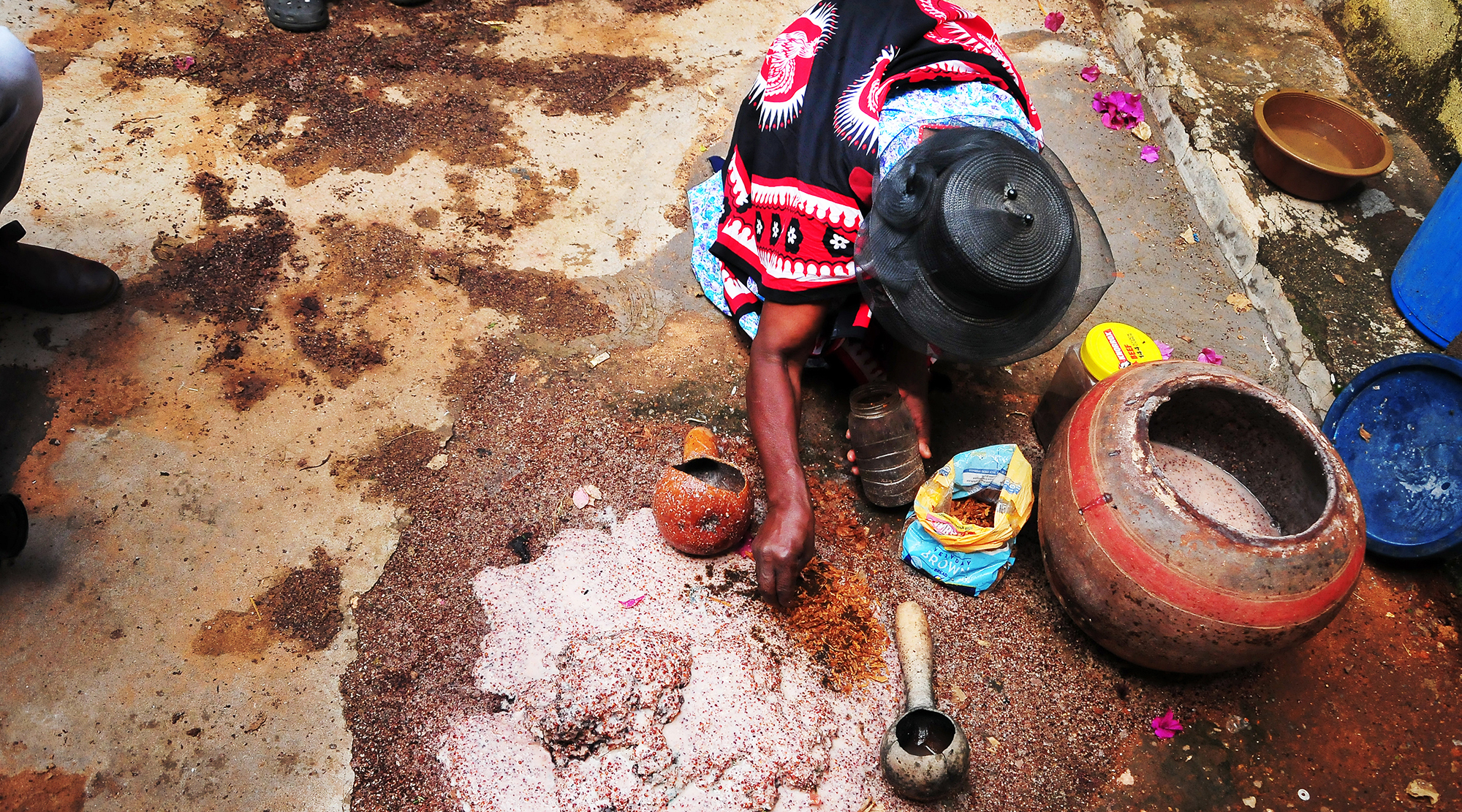
Christinah Matjiu performs a ritual to bid farewell to the ancestors before the family is relocated to Extension 14 in Mokopane. The family held steadfast against Anglo’s initial efforts to bulldoze them off the land for a paltry amount. However their lawyer has forced Anglo to build the families state of the art housing and two commercial farms. (Photo: Mukurukuru Media/Lucas Ledwaba)
Christina Matjiu and her children took turns kneeling in the centre of their homestead — making offerings of tobacco, sorghum beer and snuff on the cow dung-coated floor.
“Eeeeeh… this is me, your daughter-in-law. I am informing you that we are leaving now. We are going away. Do not be surprised if you don’t find us here anymore. We are taking you with us to our new home…” the elder said in Sepedi, speaking in a slow, melancholic voice as she made the offering to the gods, pouring beer on the floor from a calabash.
It was early December and Matjiu had risen much earlier than usual to lead her family in a sacred ceremony as they prepared to depart from the land they have called home for almost half a century.
They had fought a long, bruising battle against Anglo American Platinum. But now the time had come for the family to finally move from their ancestral land. In the past decade they had watched the dull grey dunes from the Mogalakwena Platinum Mine tower ever closer to their home and bury the lands where they once cultivated maize, watermelon, beans, potatoes and other crops.
They had watched elders look on helplessly with frustration and anger as the mine grew ever closer, turning their once peaceful village into a dust bowl surrounded by man-made hills of rocks from the belly of the earth.
The Mogalakwena Platinum Mine is about 20km north-west of Mokopane. According to its owners, Anglo American Platinum, the mining rights covers an area of 137km2, making it potentially one of the biggest open pit platinum mine in the world and its reserves are expected to last until 2040.
Matjiu and her husband raised seven children and grandchildren in Motlhotlo. But having finally made the decision to move after many years of resistance, the family matriarch knows too well the significance of communicating the decision to those whose bones lie beneath the soil, the ones whose spirits still roam the hills to guard over and guide the living.
It was an overcast day, the grey sky pregnant with the promise of rain later in the day. Rain, especially soft showers that had pelted most of the northern parts of the country that week, is generally interpreted as a symbol of good fortune or blessings from the gods.
It could be that the rain that fell later was an affirmation from the gods, that all was well, or maybe tears that their descendants were leaving the land they had bestowed upon them. But this may never be known for the ways of the gods are never truly understood or even questioned. The Matjiu, however, completed what needed to be done.
“I informed them [the gods] that we are leaving. We are going away. They must not wonder and worry when they can’t find us here. They must know we have left and must know where to find us. We carry them with us to our new home,” Matjiu said later that day as friends and family joined them for the going-away party.

An offering to the gods in the form of soghurm beer from the Matjiu family. (Photo: Mukurukuru Media/Lucas Ledwaba)
In most African cultures including the MaNdebele ase Nyakatho [Northern Ndebele] to which the Matjiu belong, land is more than just a piece of ground; it is everything, a connection to the spirits, a gift from the ancestors, which they hold in trust on behalf of their children, their children’s children and way beyond. To simply give it away without a fight is considered a grave transgression against the gods — hence they put up a fight against Anglo.
Matjiu has lived in Motlhotlo, a rural village in the Mogalakwena Local Municipality, Waterberg district of Limpopo, since 1971 when she got married to her now late husband. Together they built a large homestead in which they raised their nine children. Two of the children have since died and are buried in Motlhotlo. Their surviving children have also built their own homes around the homestead and raised their own offspring there.
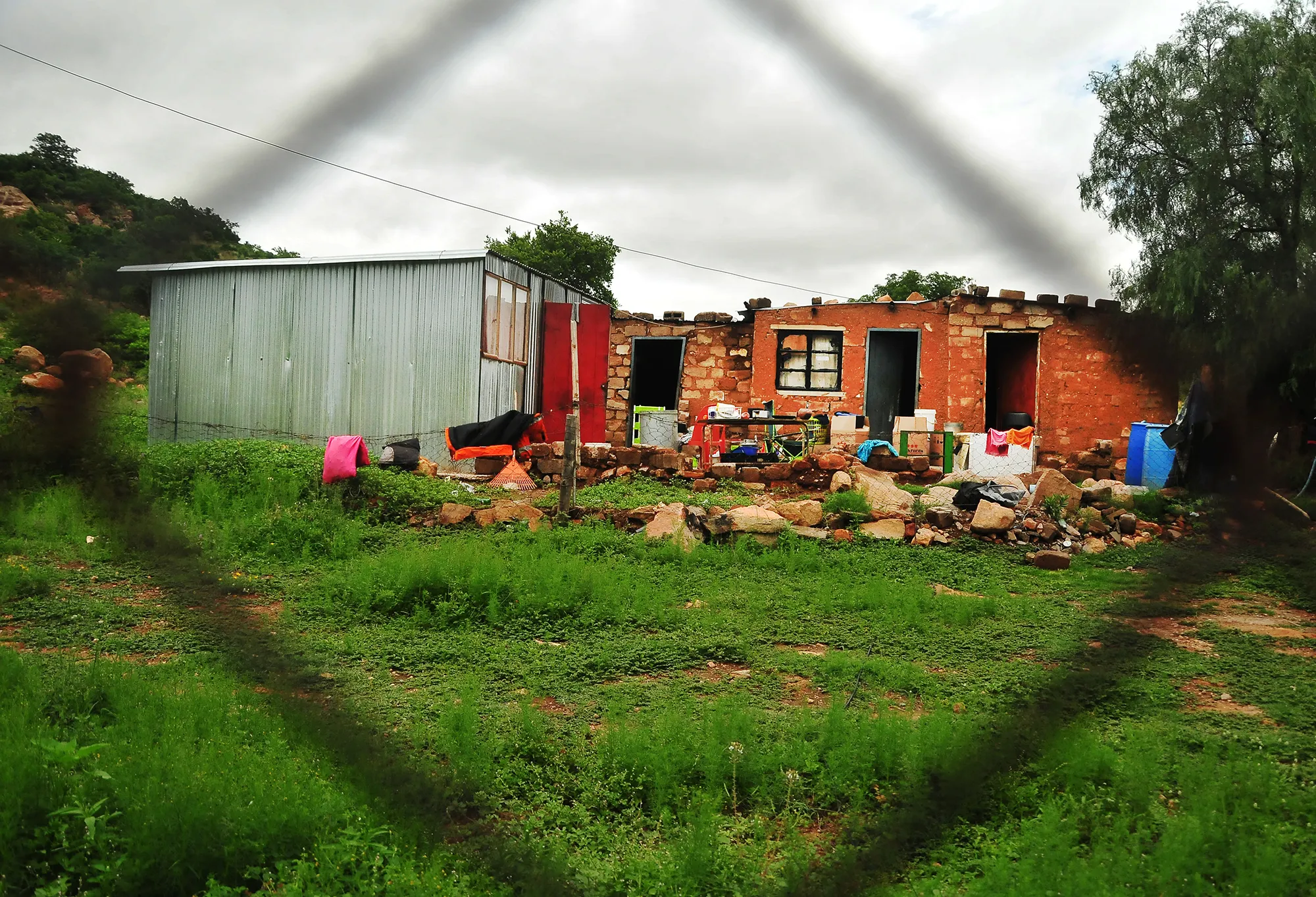
One of the Matjiu homesteads to be demolished to make way for the Anglo Amercian Platinum’s Mogalakwena Platinum Mine.The famiy have moved into new homes in Extension 14 built by Anglo. (Photo: Mukurukuru Media/Lucas Ledwaba)
The initial negotiations started in the 1990s. The first families moved from Mothlotlo in 2007.
Anglo entered into an agreement with the Langa Traditional Authority for a settlement on the relocation of the communities of Motlhotlo, Ga-Sekhaolelo and Ga-Phuka. But this proved disastrous as a result of a lack of consultation between Anglo, the traditional authority’s appointed representatives, and the communities.
The communities also resisted Anglo’s attempt to bully them off their land in exchange for a pittance, a blatant raw deal in which the multinational was offering only R20,000 in compensation and a house in a new semi-township development.
Johan Lorenzen, an attorney working with human rights lawyer Richard Spoor to help fight the community’s cause, described the earlier attitude by Anglo as “here is R2,000 [or] R5,000, good luck and have a nice life” kind of approach to the community.
The Human Rights and Business Dilemmas Forum argues that resettling people means more than just replacing their homes, hence giving them financial compensation is not always a straightforward solution.
“Resettling communities means that residents may lose land on which their families and ancestors have lived for centuries. It is land which has provided the conditions to support the residents’ livelihoods for many years. Their social life is situated among their neighbours. Children have grown up to go to the community school. Some groups, particularly indigenous groups, may attach spiritual or religious meaning to the land,” notes the forum, a joint initiative between the United Nations Global Compact and British-based global risk and strategic consulting firm Verisk Maplecroft.
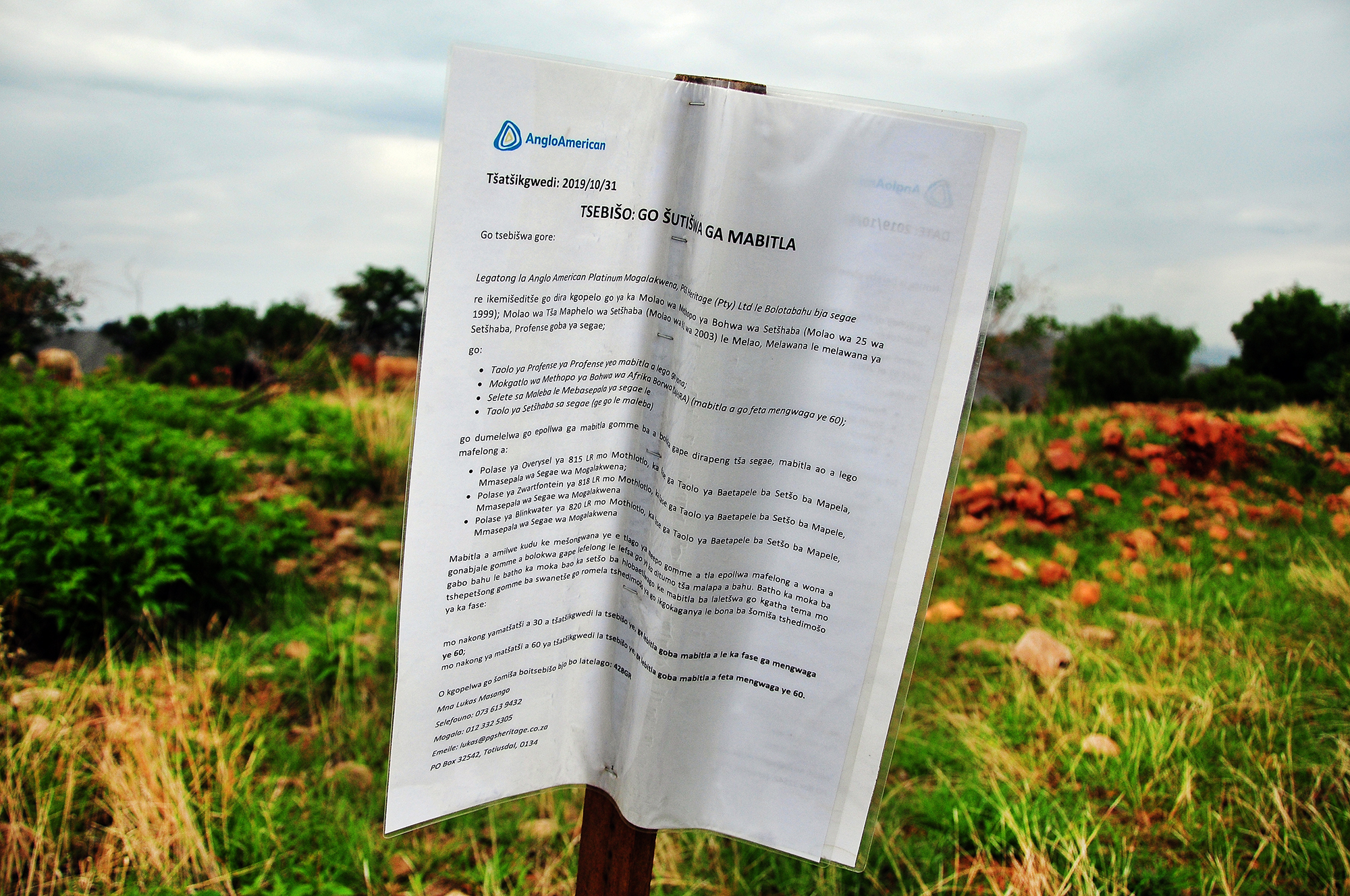
Notice for the removal of graves by Anglo American Platinum, Motlhlotlo, Mokopane. (Photo: Mukurukuru Media/Lucas Ledwaba)
This spiritual attachment to the land is aptly captured in the celebrated 1960s novel Hold My Hand I’m Dying, in which author John Gordon Davis detailed the struggle of the Batonka people facing relocation to make way for the construction of the Kariba Dam.
In the book one frantic old man who like the Matjiu resisted the relocation, knelt at the graves of his ancestors and promised them: “I swear I will never leave you my ancestors… for that is a shameful and a foolish thing.”
With the mining operations edging so close to their homes that they could smell the dust and hear the roar of the giant tipper trucks, it was inevitable the Matjiu would eventually leave. But they wanted to do so on their terms.
Jana Marais, spokesperson for Anglo American Platinum, said the Motlhotlo resettlement was initiated in 2005 and all 956 households at the time agreed to relocate. Marais said subsequently that 64 households retracted their decision, electing to remain on the property. Matjiu’s family was among these 64 who later sought the services of Spoor to fight for a better deal.
Marais said the number of households at Motlhotlo grew from 64 to 156 by 2012 and following negotiations, a relocation agreement was signed with the community in June 2012 and Anglo appointed external experts to develop a resettlement action plan.
She said of the 156 households, 92 relocated to the new villages at Armoede and Rooibokfontein and three households selected a location of their choice within a 50km radius of Mogalakwena Platinum Mine and that a separate charter was issued to formalise the relocation project for the remaining 63 households.
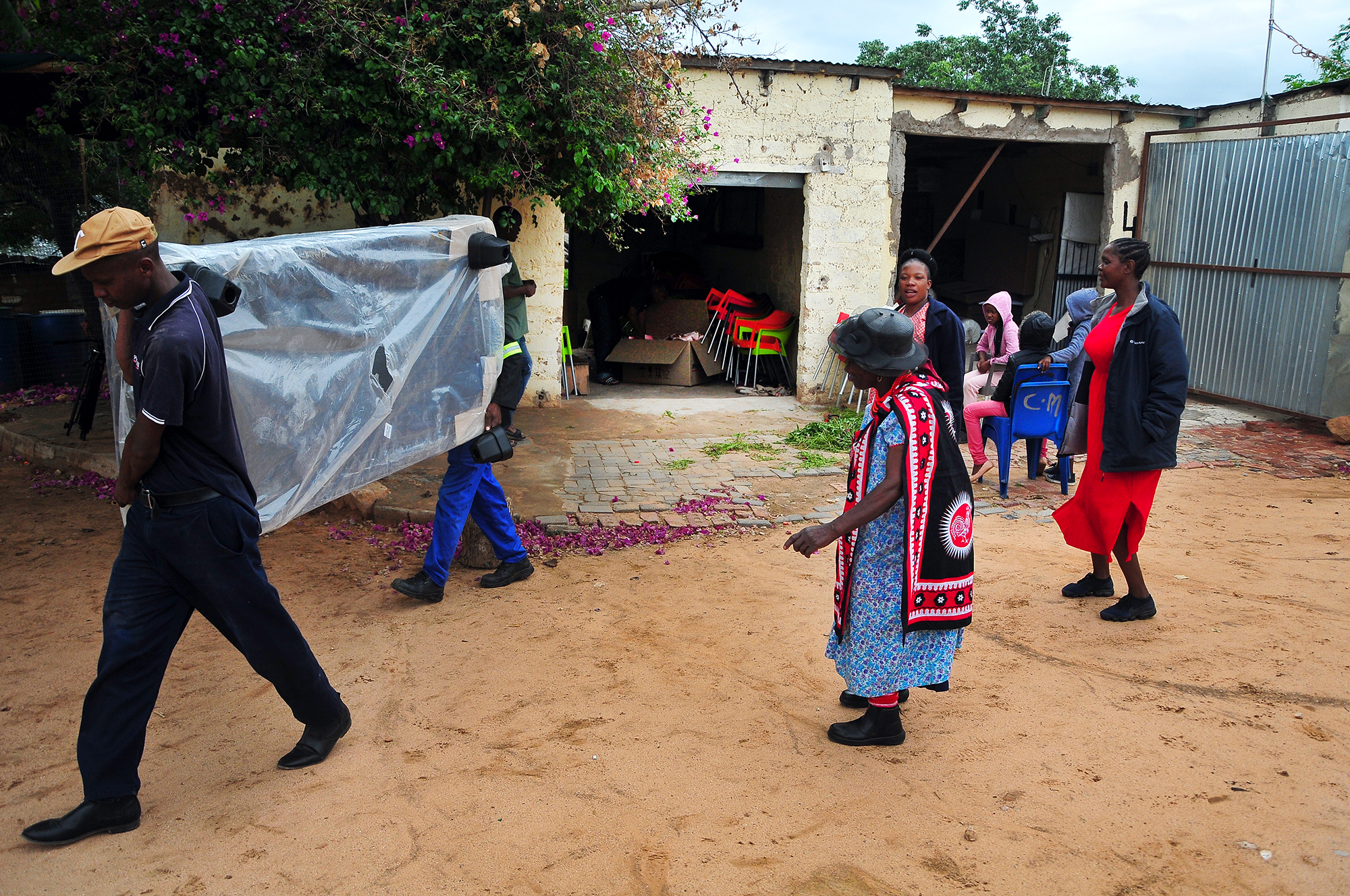
The Matjiu family sing in celebration as workmen load their belongings onto a truck as they leave their home of the past half a century to start a new life in Extension 14. (Photo: Mukurukuru Media/Lucas Ledwaba)
Although Matjiu and her family finally left Motlhotlo for Extension 14 in early December 2019 after a drawn-out battle with Anglo, in the end theirs was not the acrimonious relocation that often sees communities losing their land and left to fend for themselves in a new, unfamiliar environment.
Lorenzen said the deal with Anglo “sets a very important precedent in terms of what is the minimum standard for community when you want to profit off a community land”.
As part of the deal the relocated households have each moved into a new house designed to their own needs with running water, electricity, built-in kitchen and cupboard units in bedrooms with a tiled roof. Most importantly, they will be given title deeds to their homes. Matjiu and each of her children have a new house of their own.
Lorenzen added that as part of the deal, Anglo has already hired 38 people from the 49 households that have agreed to move.
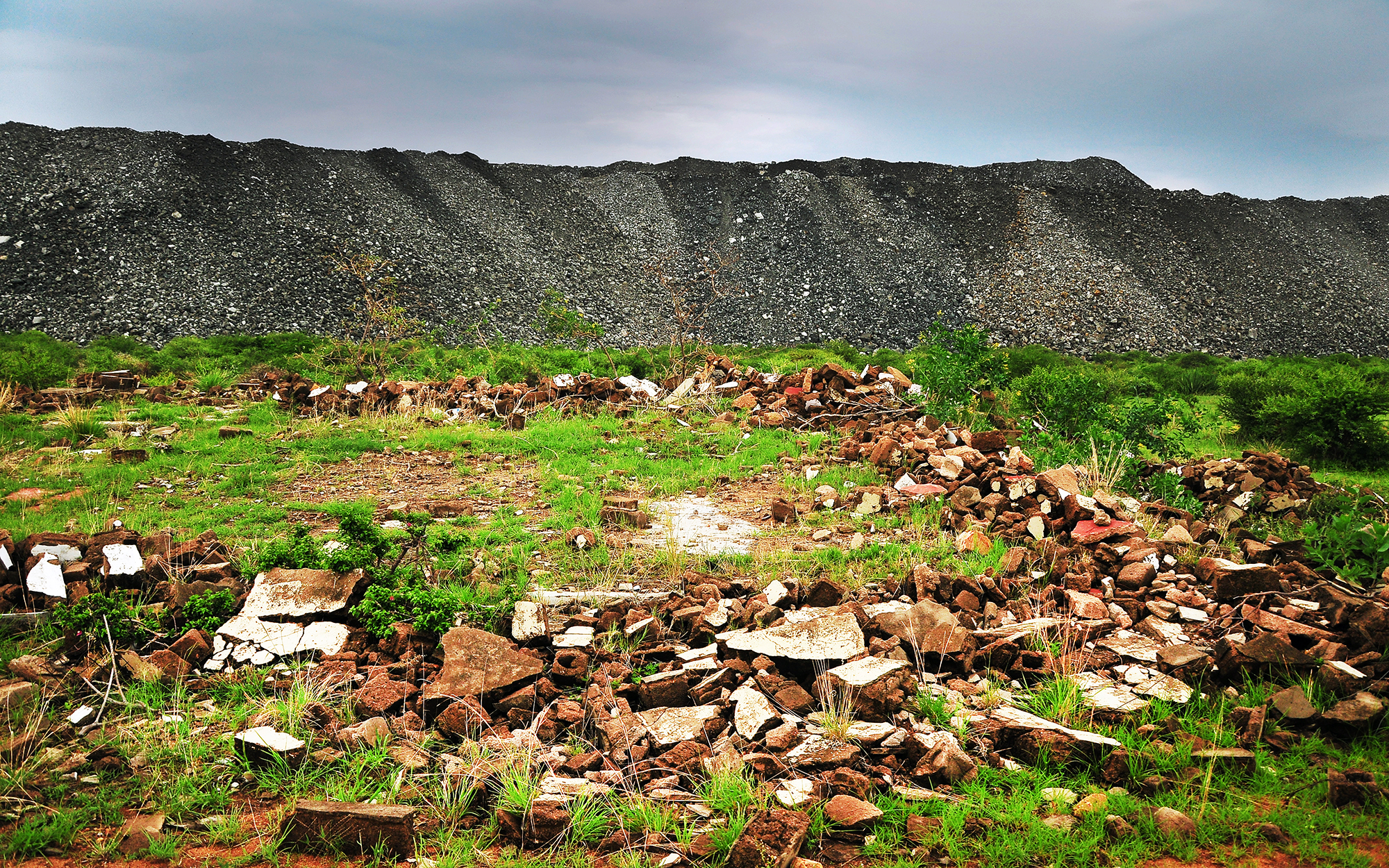
The remains of what used to be a school in Mothlotlo. The community is being relocated to make way for the Mogalakwena Platinum Mine owned by Anglo American Platinum in Limpopo. (Photo: Mukurukuru Media/Lucas Ledwaba)
The community is also getting a cash payment in advance on relocation and another cash payment as part of relocation and that for six months following, they will also get monthly cash payments to allow themselves to get settled.
In addition Anglo has purchased two commercial farms of more than 477ha and has set up a trust of R2-million for the maintenance of communal infrastructure and the provision of communal services. The trust amount related to the agricultural lands is R12.5 million (plus interest), to ensure the land can be used for livelihoods restoration
Marais said “the main principle is that households may not be left worse off after a resettlement” and that “all households will therefore be supported to develop a sustainable livelihood.”
“Schooling is being paid for because the households did not pay for schooling in the villages; all suitable education will be provided at no cost to the households. Each household will receive electricity vouchers and their rates and taxes will be paid for a fixed period. During the allotted time, Anglo American is committed to assist the households to adjust to living in an urban setting. Inflation adjustments were made for payment of other allowances,” said Marais.
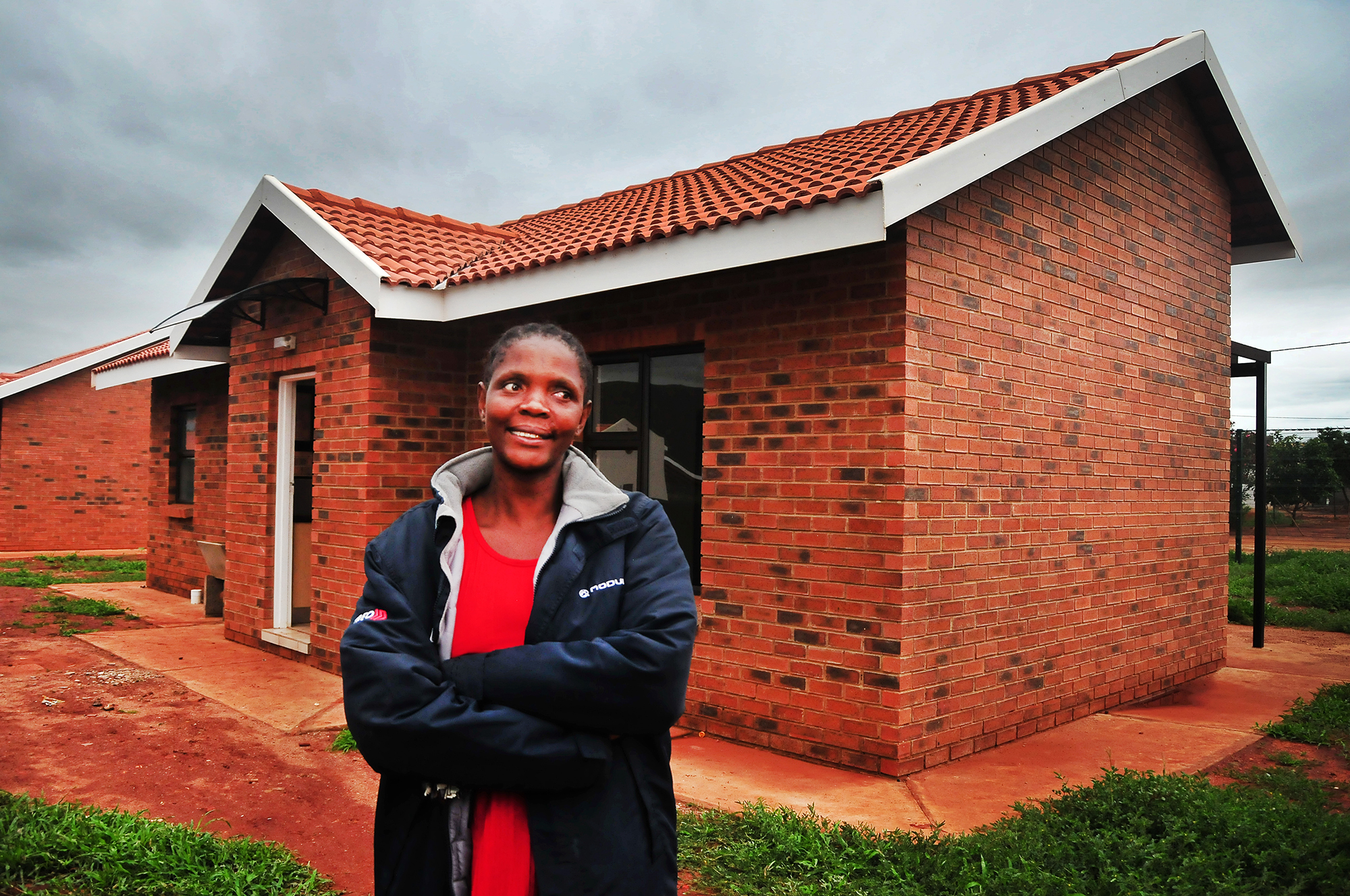
Victoria Mantjiu relaxes in front of her new home in Extension 14 in Mokopane at a village built by Anglo American Platinum. Mantjiu was one of the opponents of the forced relocation by Anglo. She was detained and spent nine days in police custody after she was shot by mine security during a protest by community members. She is now employed by Anglo together with her daughter and siblings. (Photo: Mukurukuru Media/Lucas Ledwaba)
Matjiu and her family arrived at their new home in Extension 14 on a cool Monday evening the weekend after the ceremony to bid farewell to the gods. After a long, frustrating day of waiting, the sight of the removals truck negotiating the dusty road towards their homestead brought some relief.
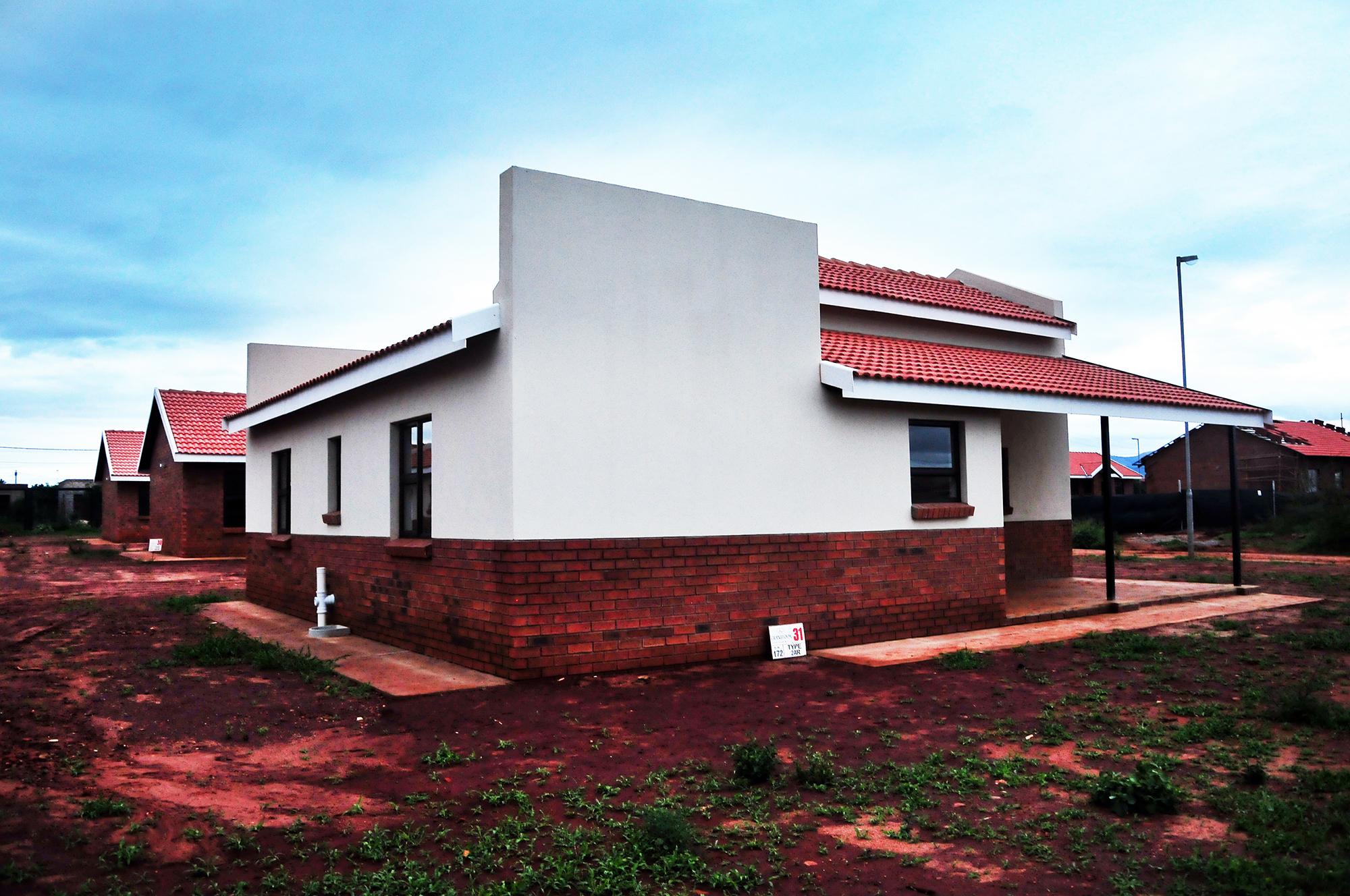
New housing units for Motlhotlo community in Extension 14 Mokopane, Limpopo. The homes were built by Anglo American Platinum as part of an agreement with the Motlhotlo community who have refused an earlier offer to move from their ancestral land. Photo: Lucas Ledwaba/Mukurukuru Media
Matjiu and her two daughters Helen and Victoria broke into song as workmen began loading the furniture, clothes, dishes, cutlery and other household goods they had spent all week packing into boxes. The matriarch Matjiu expressed satisfaction and relief that at last the relocation was finally happening. She could no longer stand the sight of the imposing mine dumps.
Victoria is now employed at the mine as a tar dozer operator. She received training on the job. Her eldest daughter Mmathapelo also works at Mogalakwena Platinum Mine as do six other family members as part of the relocation and empowerment deal.
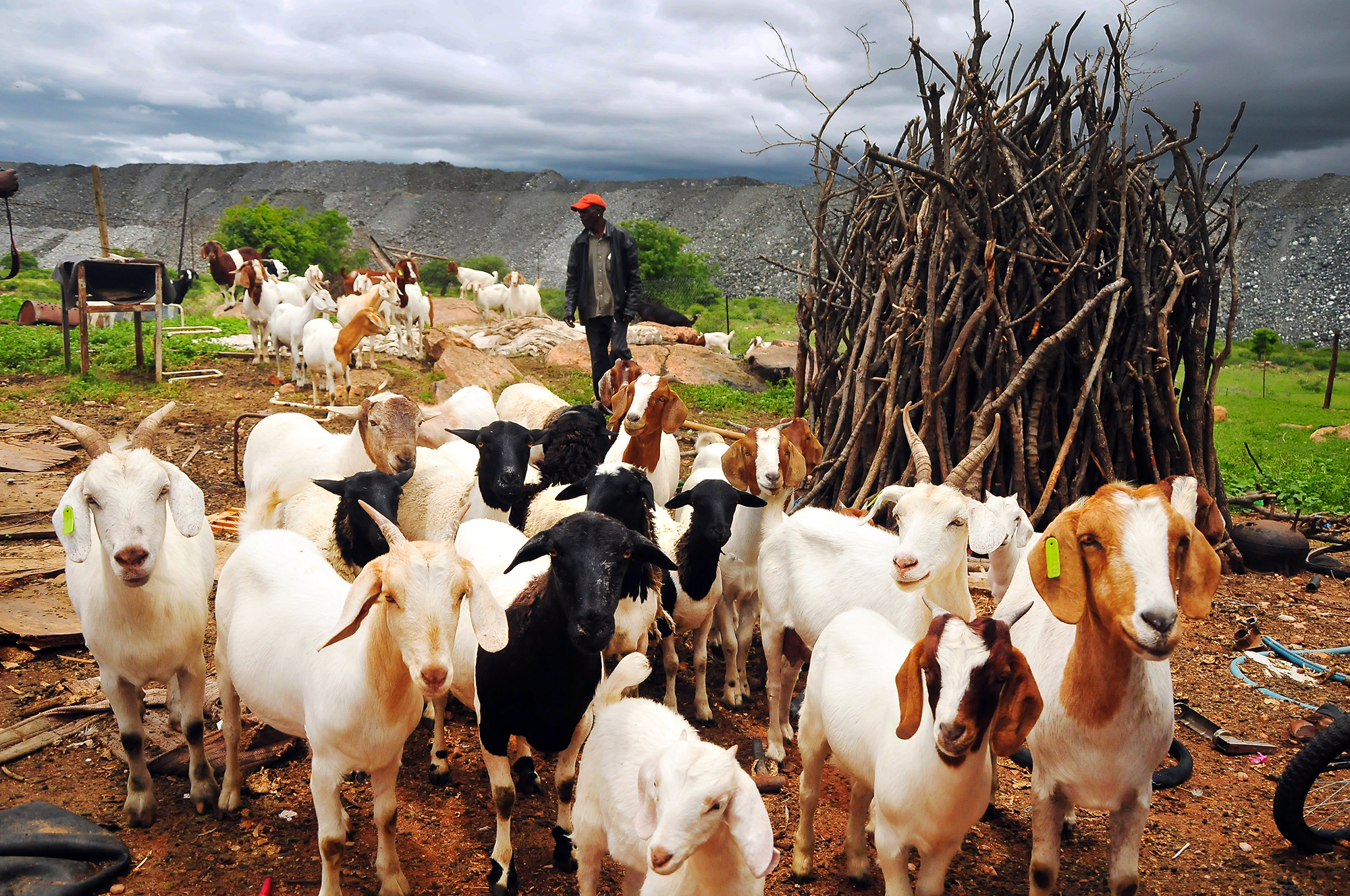
The Matjiu family livestock will be sold and the money given to them. Anglo has bought two commercial farms for the community. (Photo: Mukurukuru Media/Lucas Ledwaba)
It’s a bittersweet ending for Victoria, though. She is still troubled by an injury to her upper lip caused by a rubber bullet fired by mine security in 2014. Still carrying injuries from the shooting, Victoria spent nine days in police custody awaiting trial before she was eventually released.
“I love this place. But the situation is forcing us to leave. It is no longer safe here. This place is no longer fit for people to live in. We have tolerated this for 12 years. We have been fighting, but now we are tired,” she said.
Victoria said unlike in the past when Anglo tried to bully the community off the land, they are now happy with the settlement; hence they have decided to finally make way for the mine.
Lorenzen said there were two turning points in the engagement between Anglo and the community over the relocation, which was the subject of an investigation by the SA Human Rights Commission.
The human rights watchdog launched an investigation in 2008 after the non-government organisation ActionAid accused Anglo American Platinum of violating the rights of the communities living near the mine in a scathing report against the multinational.
Lorenzen said one of the turning points was in 2012 when Anglo executive Ben Magara “really made intervention that the fight has been going on for too long and so we can’t continue like this forever’.
He said the second was in 2018 “with a fresh push from Anglo to do the right thing”.
“I can’t tell what was in their heads… but they brought a fresh push and fresh resources to make it happen,” he said.
Marais said the current resettlement plan was informed by the internationally accepted good-practice guidance in the International Finance Corporation’s (IFC) performance standard 5, as well as Anglo American’s Social Way requirements.
The IFC is a 185-member organisation under the World Bank and one of its core aims is “to help businesses innovate and create jobs and opportunities for people in developing countries”.
“It should be noted that the IFC standards, as well as the Anglo American Social Way, did not exist at the time when the original resettlements were done in the late 1990s and early 2000s,” said Marais.
In response to whether this is the kind of approach Anglo will take in future and if this will also be extended to communities previously resettled to make way for Mogalakwena Platinum Mine, Marais said Anglo “has appointed independent consultants to conduct a review of its historic resettlements to assess the status of these communities”.
She said work on the remediation plan is under way and communication to communities on this will continue during 2020.
It is a new beginning and somewhat of a victory for the family and the community that held out for more than a decade to get a deal that would not leave them worse off.
Yet the emotional scars from the protracted battle and memories of those who, like Sara Tsebe, died before the finalisation of the deal remain. Tsebe, the oldest resident in the village, was a fierce opponent of the relocation.
“I am happy. But I am thinking of my husband and all those who died while we were fighting the mine [Anglo]. They did not live to see this day, but I know they are also happy,” Matjiu said. MC
This article first appeared in Mukurukuru Media.






















 Become an Insider
Become an Insider